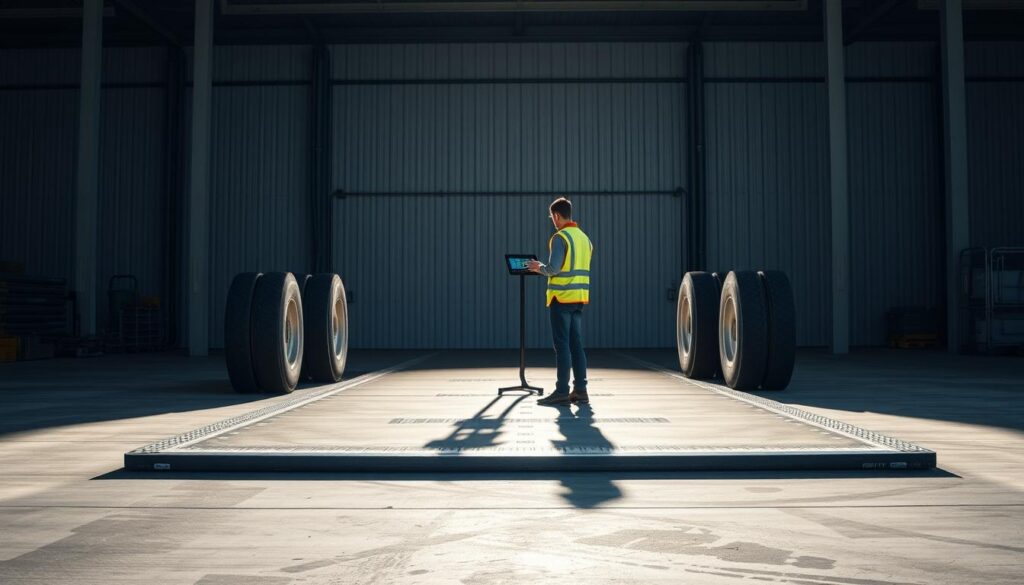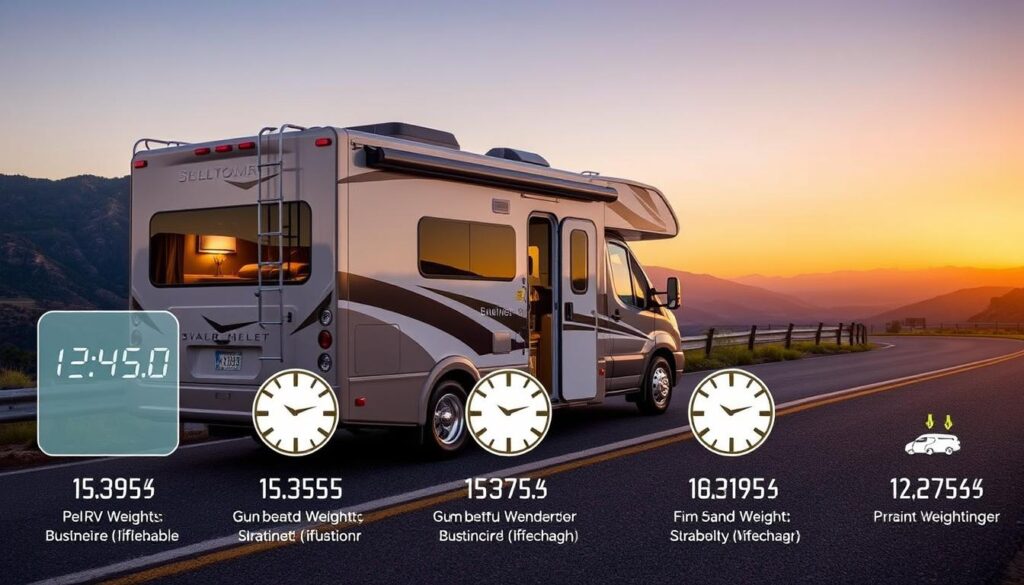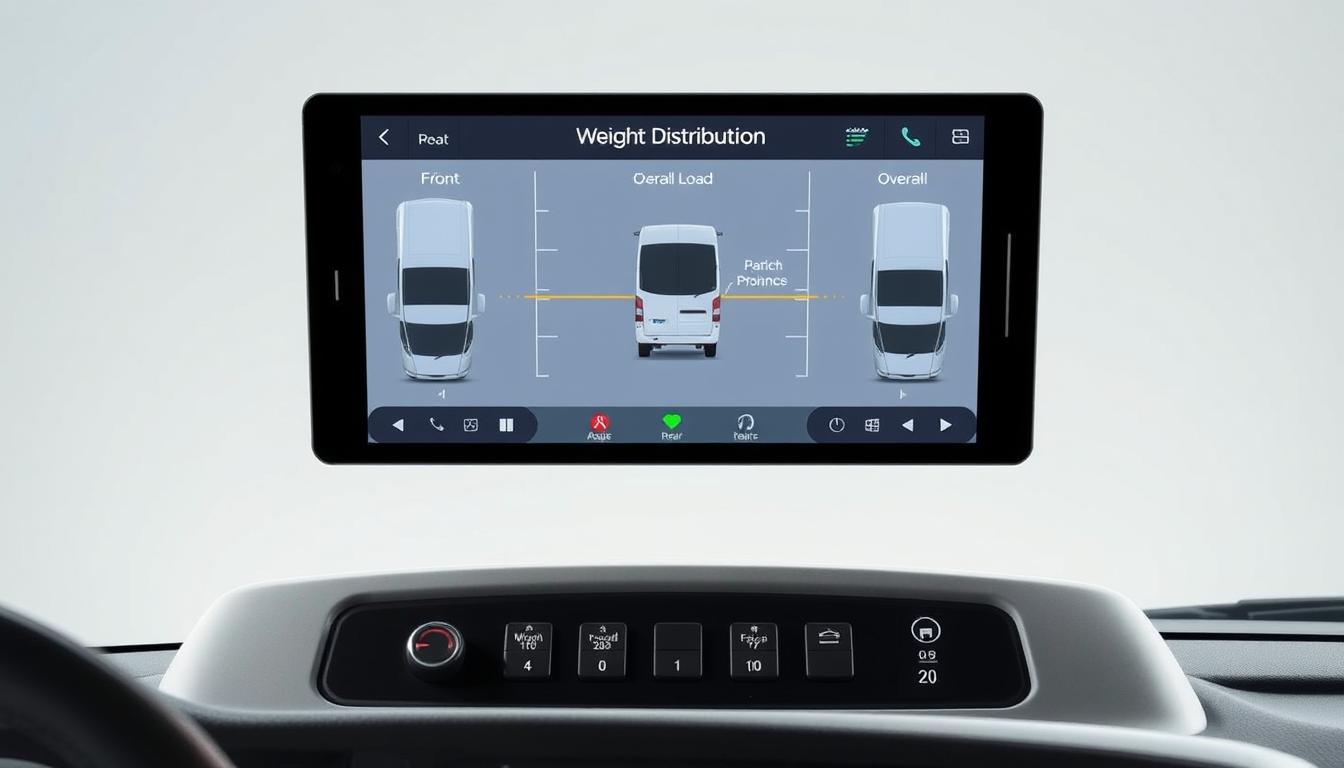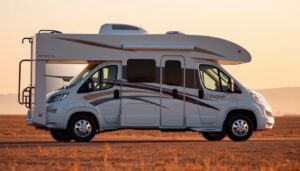Tips
Balanced loading for RV travel, Class C motorhome weight distribution, Class C RV weight management, Digital tools for RV balance, Overloading prevention for motorhomes, RV weight distribution calculator, Safe weight distribution in motorhomes, Weight distribution apps for motorhomes
Hellen Louyse
0 Comentários
Balance your Class C motorhome with digital tools for safe weight distribution
Ever thought about how shifting weight can change your Class C motorhome’s safety and performance? Getting the weight right is key for RV safety. But many owners don’t know how important it is. Luckily, digital tools make managing weight easier than before.
We’ll explore the basics of weight distribution, explain important terms, and show you how to use modern tools. These tools help make sure your motorhome stays safe and within its limits while you’re on the road.
The Importance of Weight Distribution in Class C Motorhomes
Weight distribution is crucial for Class C motorhomes. It greatly affects motorhome performance and is key for a smooth ride. An unbalanced vehicle can cause swaying and make steering hard, risking safe RV travel.
Uneven weight can lead to tire blowouts and wear down suspension parts. Proper weight distribution improves stability and control. It also ensures all wheels touch the road well, which is vital for safe braking and cornering.
Proper weight balance is more than just comfort. It can lower accident risks by improving handling and braking. Keeping your motorhome’s weight evenly distributed makes your journey safer.
Understanding weight distribution also helps with better fuel efficiency. This makes trips safer and more affordable. Whether on highways or back roads, paying attention to weight distribution is essential for a safe and enjoyable RV trip.
Understanding Weight Terminology for RVs
Knowing RV weight terms is key for any owner. Terms like GVWR, GCWR, GAWR, UVW, and CCC help manage safety and performance. They guide how to measure and distribute weight for a Class C motorhome.
Gross Vehicle Weight Rating (GVWR)
GVWR is the max weight a manufacturer allows for a fully loaded RV. It includes the RV’s weight, passengers, cargo, and extra equipment. Going over this weight can risk safety and handling.
Gross Combination Weight Rating (GCWR)
GCWR is the total weight of the RV, trailer, and cargo. It’s important to ensure the tow vehicle and trailer can operate safely without overloading.
Gross Axle Weight Rating (GAWR)
GAWR shows the max weight a single axle can handle. Knowing this helps ensure each axle supports the weight, improving stability and reducing wear.
Unloaded Vehicle Weight (UVW)
UVW is the RV’s weight when it leaves the factory, with all standard equipment and fluids. It helps owners figure out how much extra weight they can add safely.
Cargo Carrying Capacity (CCC)
CCC is the max weight that can be added to the RV beyond its UVW. This includes passengers, gear, and add-ons, highlighting the need for careful load management.
| Term | Definition |
|---|---|
| GVWR | Maximum weight of the fully loaded RV as specified by the manufacturer. |
| GCWR | Total weight of the RV and trailer combined, including cargo. |
| GAWR | Maximum weight limit for a single axle of the RV. |
| UVW | Weight of the RV at the time of delivery, including standard equipment. |
| CCC | Maximum additional weight the RV can carry beyond its unloaded weight. |
Consequences of Overloading Your Motorhome
Overloading an RV can cause serious problems. It affects how well the RV works and how safe it is. An overloaded RV puts extra stress on parts like brakes, suspension, and tires.
This extra stress can lead to parts breaking down early. This means you’ll have to pay for expensive repairs. It also makes the RV less reliable.
Overloading also makes the RV very unsafe. It can make tires burst, which can be very dangerous. If a tire bursts, it’s hard to control the RV. This can turn a fun trip into a scary one.
Driving an overloaded RV is risky. It’s not just about physical safety. It’s also about the safety of everyone on the road.
It’s important for RV owners to know about these risks. Keeping the RV at the right weight helps it work better for longer. It also makes driving safer for everyone.
Identifying Resources for RV Weight Measurement
Knowing and managing your RV’s weight is key for safe travel. Many resources can help you with this. With the right tools and info, you can keep your motorhome within safe weight limits. This makes driving safer.
Utilizing Owner’s Manuals
Owner’s manuals are a must for RV owners. They have important details on weight limits and how to load your RV. They usually talk about Gross Vehicle Weight Rating (GVWR) and other key metrics. Checking your RV manual often helps avoid overloading and keeps your motorhome safe.
Websites and Online Communities
Many websites and RV communities are great for managing weight. Forums and groups let RV owners share tips and advice. Talking with others can give you useful insights on weight distribution and its effects on your trips.
RV Safety and Education Foundation (RVSEF)
The RV Safety and Education Foundation (RVSEF) focuses on teaching RV owners about weight safety. They offer weighing services all over the country. Using RVSEF’s resources can greatly improve your RV experience while keeping you safe on the road.
How to Weigh Your RV Effectively
To weigh your RV right, use different methods. First, go to a truck scale to weigh your RV fully loaded. This gives you a basic idea of its total weight. Then, use wheel position weighing to check each axle’s weight. This helps you balance the weight evenly across your RV.
Using RV scales helps keep you safe and your RV running well. After getting all the weight readings, compare them to your RV’s GVWR and GAWR. Adjusting as needed keeps your RV within safe limits on the road.
The Role of Truck Scales in Weight Distribution
Truck scales are key for checking a vehicle’s weight, especially for RVs. They help ensure safety, stability, and performance. By using truck scales, RV owners can check their weight distribution. This makes sure their vehicles are loaded right and safe.
Finding a Nearby Truck Scale
Finding a truck scale near you is easy. Many online tools and apps list truck scale locations. Just type in your location to find the nearest ones. This is great for RVers who need to check their weight before a long journey.
Understanding Scale Readouts
Understanding the scale readouts is important after weighing your RV. The operator will give you details on axle weights and total weight. Talking to the operator can clear up any questions. Knowing the scale readouts helps RV owners make the right adjustments for safe travel.

Tools to Calculate Ideal Weight Distribution in Class C Motorhome
Keeping the weight right in a Class C motorhome is key for safety and smooth driving. Using the right tools helps balance both people and cargo. This makes the RV ride more stable.
Digital RV calculators make quick and precise weight checks easy. There are also mobile apps for weight management. These apps give live updates on how weight affects the motorhome’s handling. They’re easy to use, great for both experienced and new RVers.
Using these tools helps RV owners steer clear of common weight issues. Knowing how to calculate weight makes trips safer and helps the RV last longer. It makes every journey more fun.
Leveraging Digital Tools for Accurate Weight Measurement
Getting the right weight is key for safe RV travel. Digital tools make this easier and more efficient for RV owners. They help manage the vehicle’s weight, making it safer and better on the road.
Weight Distribution Calculators
Weight distribution calculators are great for RV owners. They help keep the RV balanced. By inputting details like size and cargo, users get tips for loading the RV right.
This leads to safer driving and a longer vehicle life.
Mobile Apps for RV Weight Management
RV apps have changed how we manage weight. They let RVers track weight easily. These apps offer tools like calculators and reminders for checks.
Best Practices for Weight Management
For RV owners, managing weight is key to safe travel. It’s important to weigh your RV often. This keeps the load balanced, preventing accidents from bad weight distribution.
Organizing cargo well is also crucial. Put heavy items low and in the middle. This improves balance and stability on the road. Keeping track of cargo helps you stay within safe weight limits.
Adding RV safety tips to your routine helps too. Check your fuel and water levels before you leave. Aim for a balance between full and empty tanks. This keeps your vehicle stable and safe to drive.
By following these tips, RV owners can lower risks and enjoy safer trips. Safety comes from careful planning and execution. This makes every journey fun and secure.
Adjustments to Consider During Travel
Traveling in a Class C motorhome means keeping weight balanced for safety and performance. Speed, terrain, and moving cargo can change the weight. Making travel adjustments like moving cargo and managing RV tanks can help keep things balanced.
Relocating Cargo for Better Balance
Moving cargo in your motorhome can improve weight distribution. Putting heavy items in different parts of the vehicle helps prevent swaying. Use storage areas that help keep the vehicle balanced and hold all your stuff.
Managing Fuel and Water Tank Levels
Managing RV tanks is key to keeping the vehicle stable. A full water tank can affect how the RV handles. Adjust water levels based on your trip plans. Fill tanks as needed for long trips, balancing resource use with weight.
Utilizing Advanced Hitch Systems for Safety
Advanced hitch systems are key for safe and stable towing of Class C motorhomes. Choosing the right system is crucial for a good towing experience. The Equal-i-zer hitch is a top choice due to its unique features that solve common towing problems.
Benefits of an Equal-i-zer Hitch
The Equal-i-zer hitch offers many benefits for safer towing. These include:
- Superior sway control, providing enhanced stability in various driving conditions.
- Efficient weight distribution, ensuring even load transfer between the tow vehicle and the trailer.
- Durable construction, designed to withstand the demands of heavy towing.
These features make the Equal-i-zer hitch a favorite among RV fans for safer trips.
Importance of Proper Hitch Setup
Setting up the hitch correctly is very important. A well-installed hitch keeps the motorhome stable while driving. A bad setup can cause problems like:
- Increased sway, making the vehicle harder to control.
- Uneven weight distribution, which can affect braking and handling.
- Potential damage to the motorhome or trailer if not adequately secured.
Following the manufacturer’s instructions for hitch setup is vital for a safe and fun towing experience.
Understanding the Effects of Vehicle Modifications on Weight
Many RV owners add features to make their homes on wheels more comfortable and useful. But they often overlook how these changes affect the weight. Adding heavy appliances or new flooring can make a Class C motorhome much heavier.
This weight shift can change how the RV handles and its overall stability. It’s important for owners to understand these effects.
Modifying an RV can also impact safety. Even small changes can make the vehicle too heavy. Before making any upgrades, owners should think about the added weight and how it affects their cargo and fuel.
This careful planning ensures safety on the road. It’s not just about comfort; it’s about safe driving.
Every change to an RV should be thought out carefully. It’s about keeping the vehicle balanced and safe to drive. This balance is key for a smooth and safe journey.

Professional Weighing Services and Their Benefits
Investing in professional weighing services for your Class C motorhome is smart. It gives you precise measurements. This lets RV owners keep an eye on their vehicle’s weight distribution.
Professional assessments ensure weight accuracy, which is key for safety. Organizations like RV Safety and Education Foundation (RVSEF) offer weighing and expert advice. They help RV owners understand their results and make needed changes.
Choosing professional weighing services gives RV owners reliable data. This data helps them manage cargo and improve their vehicle’s performance. Proper weight distribution is crucial for safety on the road.
Conclusion
Keeping the right weight in a Class C motorhome is key for safety and better performance. Safe RV practices help travelers enjoy their trips without worry. By using smart weight management, RV owners can make their vehicles stable and balanced.
Using digital tools to measure weight makes RV travel safer. Tools like weight calculators and apps help track loads and follow best practices. This focus on weight management makes RV trips enjoyable and stress-free.
In short, following weight management rules keeps the vehicle safe and makes trips more enjoyable. RV fans can now go on their adventures with confidence. They know they’re focusing on safety and performance on every journey.
FAQ
Why is weight distribution important in a Class C motorhome?
Weight distribution keeps your RV stable and in control. It prevents swaying, steering issues, and tire blowouts. Proper balance is key for safe driving and extends your RV’s life.
What does GVWR stand for and why is it important?
GVWR stands for Gross Vehicle Weight Rating. It’s the max weight your RV can handle. Knowing this limit helps avoid overloading and ensures safe driving.
How can I measure my RV’s weight accurately?
To get an accurate weight, visit a truck scale with your RV fully loaded. Also, use wheel position weighing for detailed weight distribution across axles.
What tools are available to help with weight distribution calculations?
Digital tools like weight distribution calculators and mobile apps help RV owners manage cargo and weight. They improve travel safety.
How often should I weigh my Class C motorhome?
Weigh your RV regularly, especially before long trips or after making changes. This ensures it stays within safe weight limits and optimizes weight distribution.
What are the risks of overloading my Class C motorhome?
Overloading wears down brakes and suspension. It also increases the risk of tire blowouts, brake failures, and losing control. These risks are serious and can be dangerous.
What is the benefit of using the RV Safety and Education Foundation (RVSEF)?
RVSEF provides educational resources, weighing services, and guidance. They help RV owners follow weight regulations and ensure safe RV practices.
How can modifications affect my motorhome’s weight distribution?
Adding new appliances or flooring increases your motorhome’s weight and changes its balance. Recalculating weight distribution after changes is crucial for safety.
What adjustments can I make during travel to ensure better weight distribution?
Move cargo for better balance and adjust fuel and water tank levels. These adjustments help maintain optimal weight distribution during your journey.
Why should I consider an advanced hitch system like the Equal-i-zer hitch?
Advanced hitch systems like the Equal-i-zer hitch improve stability and control while towing. They offer better sway control and keep your motorhome balanced and safe.














